
 i_need_contribute
i_need_contribute

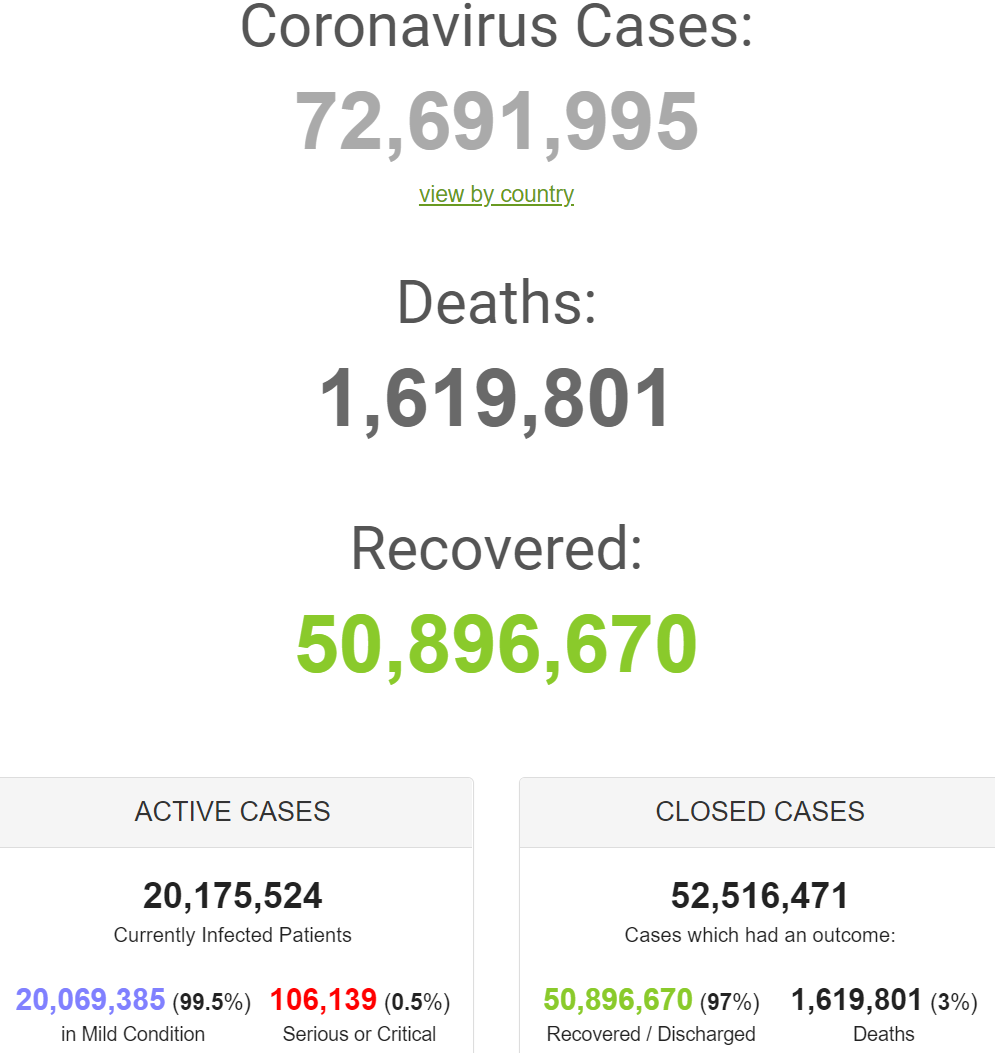
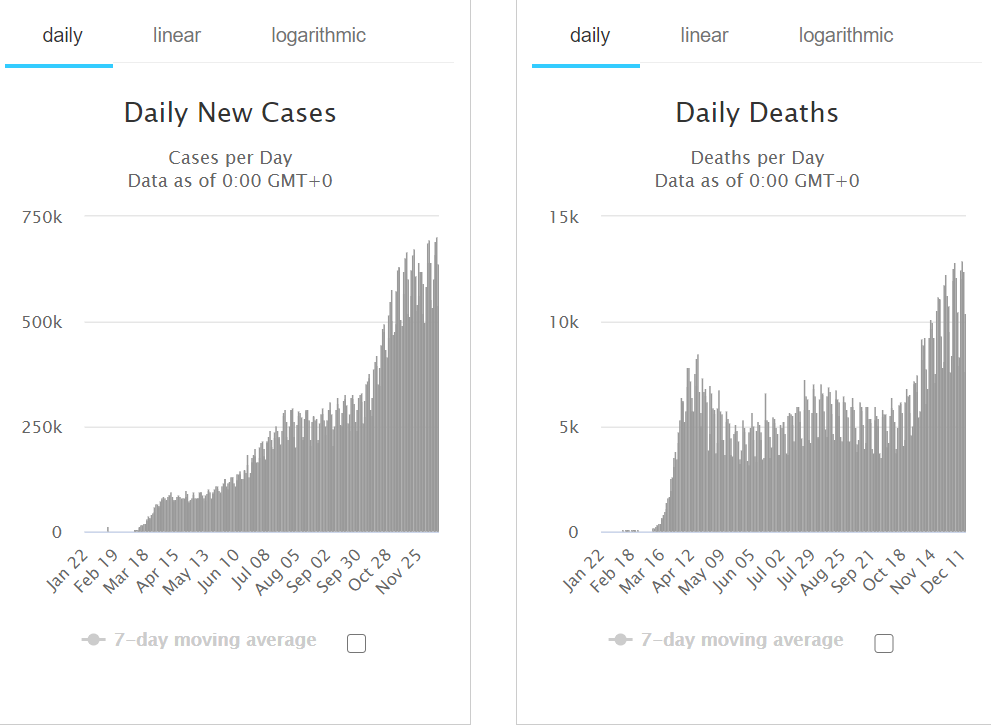
| Country, | Total | New | Total |
| Other | Cases | Cases | Deaths |
| World | 72,631,777 | 539,518 | 1,618,592 |
| USA | 16,737,267 | 187,901 | 306,459 |
| India | 9,884,716 | 27,336 | 143,393 |
| Brazil | 6,901,990 | 21,395 | 181,419 |
| Russia | 2,653,928 | 28,080 | 46,941 |
| France | 2,376,852 | 11,533 | 57,911 |
| UK | 1,849,403 | 18,447 | 64,170 |
| Italy | 1,843,712 | 17,938 | 64,520 |
| Turkey | 1,836,728 | 26,919 | 16,417 |
| Spain | 1,741,439 | 47,624 | |
| Argentina | 1,498,160 | 3,558 | 40,766 |
| Colombia | 1,425,774 | 8,702 | 39,053 |
| Germany | 1,338,483 | 17,891 | 22,406 |
| Mexico | 1,241,436 | 12,057 | 113,704 |
| Poland | 1,135,676 | 8,977 | 22,864 |
| Iran | 1,108,269 | 7,451 | 52,196 |
| Peru | 984,973 | 1,928 | 36,677 |
| Ukraine | 894,215 | 9,176 | 15,154 |
| South Africa | 860,964 | 7,999 | 23,276 |
| Indonesia | 617,820 | 6,189 | 18,819 |
| Netherlands | 613,487 | 9,884 | 10,048 |
| Belgium | 605,966 | 2,807 | 17,902 |
| Czechia | 579,080 | 3,655 | 9,564 |
| Iraq | 574,634 | 1,012 | 12,579 |
| Chile | 571,919 | 2,138 | 15,886 |
| Romania | 556,335 | 4,435 | 13,385 |
| Bangladesh | 490,533 | 1,355 | 7,052 |
| Canada | 460,743 | 5,891 | 13,431 |
| Philippines | 449,394 | 1,079 | 8,733 |
| Pakistan | 438,425 | 3,369 | 8,796 |
| Morocco | 399,609 | 2,012 | 6,624 |
| Switzerland | 373,831 | 5,985 | |
| Saudi Arabia | 359,888 | 139 | 6,048 |
| Israel | 357,176 | 1,390 | 2,999 |
| Portugal | 348,744 | 4,044 | 5,559 |
| Austria | 322,463 | 2,641 | 4,473 |
| Sweden | 320,098 | 7,514 | |
| Hungary | 280,400 | 4,153 | 6,965 |
| Serbia | 266,432 | 4,995 | 2,331 |
| Jordan | 259,614 | 2,339 | 3,365 |
| Nepal | 248,423 | 830 | 1,698 |
| Ecuador | 202,110 | 586 | 13,875 |
| Panama | 193,007 | 2,422 | 3,356 |
| Georgia | 189,726 | 2,720 | 1,790 |
| UAE | 184,949 | 1,194 | 617 |
| Bulgaria | 179,449 | 497 | 5,688 |
| Japan | 177,287 | 2,988 | 2,562 |
| Croatia | 175,886 | 3,363 | 2,640 |
| Azerbaijan | 175,874 | 4,451 | 1,922 |
| Belarus | 160,295 | 1,961 | 1,263 |
| Dominican Republic | 154,692 | 1,107 | 2,361 |
| Costa Rica | 150,947 | 1,895 | |
| Armenia | 148,325 | 1,013 | 2,486 |
| Bolivia | 147,030 | 333 | 9,014 |
| Lebanon | 146,520 | 1,275 | 1,200 |
| Kuwait | 146,218 | 174 | 911 |
| Kazakhstan | 141,578 | 794 | 2,088 |
| Qatar | 140,961 | 134 | 240 |
| Slovakia | 132,984 | 2,190 | 1,175 |
| Guatemala | 129,282 | 183 | 4,423 |
| Moldova | 126,518 | 795 | 2,572 |
| Oman | 126,240 | 571 | 1,471 |
| Greece | 124,534 | 692 | 3,625 |
| Egypt | 121,575 | 486 | 6,920 |
| Ethiopia | 116,769 | 472 | 1,806 |
| Honduras | 114,043 | 335 | 2,974 |
| Tunisia | 111,361 | 968 | 3,894 |
| Denmark | 109,758 | 2,642 | 941 |
| Palestine | 109,738 | 1,639 | 978 |
| Myanmar | 108,342 | 1,127 | 2,268 |
| Venezuela | 107,786 | 609 | 954 |
| Bosnia and Herzegovina | 101,117 | 811 | 3,336 |
| Slovenia | 96,314 | 830 | 2,063 |
| Paraguay | 93,582 | 669 | 1,953 |
| Lithuania | 93,100 | 2,848 | 815 |
| Algeria | 92,102 | 464 | 2,596 |
| Kenya | 91,892 | 366 | 1,587 |
| Libya | 90,779 | 899 | 1,299 |
| Bahrain | 89,143 | 178 | 348 |
| China | 86,725 | 24 | 4,634 |
| Malaysia | 83,475 | 1,229 | 415 |
| Kyrgyzstan | 77,356 | 297 | 1,307 |
| Ireland | 76,185 | 429 | 2,124 |
| Uzbekistan | 74,956 | 145 | 612 |
| North Macedonia | 73,638 | 613 | 2,121 |
| Nigeria | 73,175 | 418 | 1,197 |
| Singapore | 58,320 | 7 | 29 |
| Ghana | 52,933 | 327 | |
| Afghanistan | 49,273 | 321 | 1,971 |
| Albania | 48,530 | 788 | 1,003 |
| S. Korea | 42,766 | 1,030 | 580 |
| Luxembourg | 41,718 | 446 | 402 |
| El Salvador | 41,631 | 237 | 1,200 |
| Montenegro | 41,426 | 478 | 582 |
| Norway | 41,003 | 200 | 387 |
| Suriname | 5,353 | 4 | 117 |
| Aruba | 5,049 | 5 | 46 |
| Thailand | 4,209 | 17 | 60 |
| Vietnam | 1,397 | 2 | 35 |
Retrieved from: https://www.worldometers.info/coronavirus/
Story by Reuters
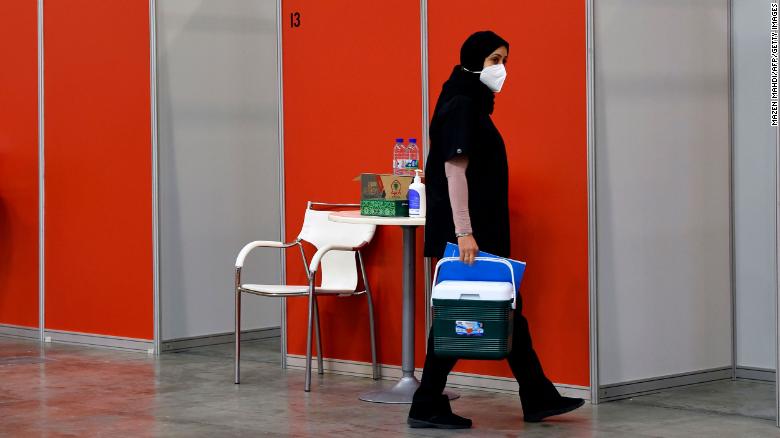
A worker in the Bahraini capital Manama's convention centre, which was repurposed for Sinopharm vaccine trials, on August 27.
In July, the UAE started Phase 3 clinical trials for the vaccine and the trial was expanded to Bahrain, Jordan and Egypt.
Neither CNBG nor Sinopharm was available for comment.
The Bahrain statement said the kingdom had participated in Phase 3 trials of the approved vaccine and had previously authorized it for emergency use to frontline professionals.
Bahrain earlier this month granted emergency use authorization for the Pfizer/BioNTech vaccine.
In fellow Gulf Arab state Kuwait, the Health Ministry on Sunday granted emergency use authorization for the Pfizer/BioNTech vaccine, state news agency KUNA said.
It came after Peru suspended trials for a Sinopharm vaccine due to a "serious adverse event" that occurred with one of the volunteers for the study, the Peruvian government said in a statement on Saturday.
The Health Ministry said the event is "under investigation to determine if it is related to the vaccine or if there is another explanation."
Sinopharm, which is conducting trials in Peru with about 12,000 volunteers, was about to complete the first stage of trials.
"The decision to temporarily suspend clinical trials is a safety measure contemplated in the regulations for clinical trials and protocols established to protect the health of research subjects," the Health Ministry said in the statement.
German Malaga, chief researcher at the local Cayetano Heredia University, which is involved with the study, said one volunteer had experienced decreased strength in his legs, among other symptoms.
By Claudia Otto, CNN
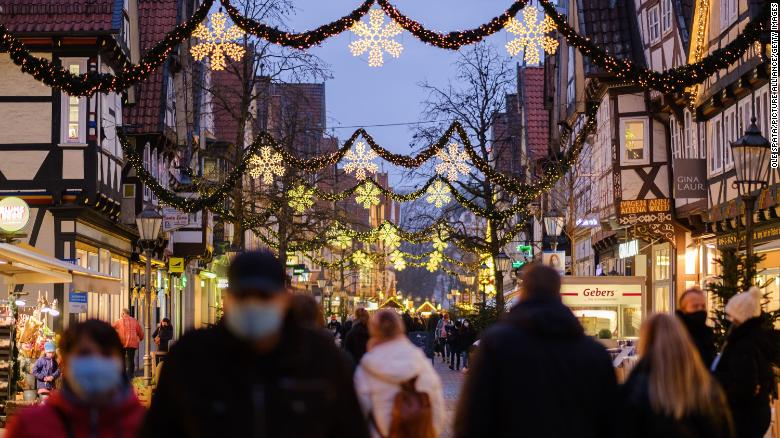
New lockdown measures will come into force from Wednesday to stem the spread of coronavirus.
Berlin (CNN)Germany will go into a "hard" national lockdown, starting next week and continuing through the Christmas period, German Chancellor Angela Merkel said Sunday, after agreeing to stricter measures with state governments to stem a wave of coronavirus cases.
As of next Wednesday, all non-essential shops, services and schools will close until January 10, and Christmas Day gatherings will be reduced from 10 people to only five from two different households.
This week, Merkel made an impassioned plea for Germans to limit their social contacts ahead of the holidays: despite the country's respected health system and early success in containing the virus, a recent partial lockdown has failed to stop the second-wave surge. Germany reported record daily deaths on Friday, with 598 fatalities tallied in a span of 24 hours.
The new measures take aim at traditional festivities: Christmas church services will be subject to prior registration with no singing allowed, alcohol is to be banned from all public spaces and an annual New Year's Eve fireworks display will be canceled. Some states are also implementing additional measures, such as Bavaria, which will have a 9 p.m. curfew.
German Finance Minister Olaf Scholz has pledged economic help for all businesses affected by the lockdown.
On Sunday, Germany recorded 20,200 new coronavirus infections -- 2,000 more than Sunday last week -- according to the Robert Koch Institute, the country's agency for disease control. The overall infection number stands at 1,320,716. The death toll rose by 321 to 21,787, data showed.
Earlier in the week, the southwestern state of Baden-Württemberg said it was introducing a curfew -- starting on Saturday and lasting until January 10 -- where people will only be allowed to leave the house for work and medical appointments, state premier Winfried Kretschmann said in a press briefing.
Meanwhile, in the northern state of Schleswig-Holstein, the maximum number permitted to meet in public and private spaces has been reduced from ten people to five people from two households, according to state premier President Daniel Günther.
In a cabinet meeting on Friday, it was announced the federal state of Thuringia would close retail stories from December 19 and students would shift to online learning from December 21 as part of the new restrictions, while, earlier this week, it was announced German states of Saxony and Bavaria would move to tougher lockdown measures.
By Emma Reynolds, CNN
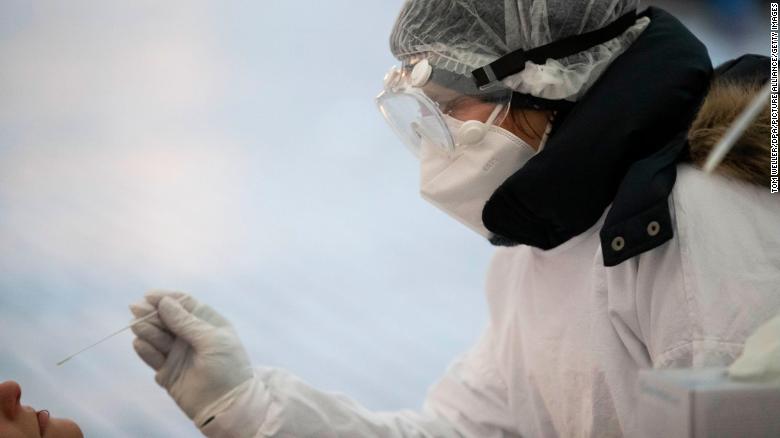
A German Red Cross worker at a rapid test station in Tübingen, Baden-Wuerttemberg on Thursday.
London (CNN)Europe is in meltdown again as daily Covid death tolls reach record highs and countries scramble to expand testing and rescue hospital systems that are buckling under the pressure.
Health experts warn that despite hopeful news with a vaccine rollout starting in the UK, drastic action is still needed to save lives as coronavirus tears through nations attempting to regain some semblance of normality.
Russia and Germany reported record daily Covid-19 deaths on Friday, and October was Russia's deadliest month in a decade. Stockholm's intensive care units hit 99% capacity as Sweden proposed a spring "pandemic law" to potentially force closures of certain public spaces. And France said its lockdown would not be eased as planned on Tuesday after daily case numbers rose on Thursday compared with last week.
Germany tallied 598 fatalities in a span of 24 hours, according to the country's center for disease control, the Robert Koch Institute.
The nation also added a record 29,875 new infections on Friday, roughly 6,000 more than the day before.
German lawmakers are set to meet in the coming days to tighten lockdown measures in a bid to get the surge in infections under control. Chancellor Angela Merkel this week made an impassioned plea for Germans to limit their social contacts ahead of the holidays and called for more restrictions.
Despite the country's much-vaunted health system and success in containing the virus earlier in the pandemic, its recent partial lockdown has failed to stop the second-wave surge.
"Germany clearly is very worried and you can see their numbers are absolutely going in the wrong direction," Linda Bauld, professor of public health at the University of Edinburgh, told CNN.
She said that was probably down to fewer restrictions and "the fact that their testing and tracing system has been under real strain."
Bauld said countries such as Spain and France had made some progress thanks to recent lockdowns, but while the UK had taken some steps forward, areas including Wales were moving backwards.
"In a number of parts of Europe, there have been restrictions that are now being loosened, and when they get loosened, people really take advantage of that and that's exactly what's happened in Wales," she added. "It's just human behavior.
"I think January is going to be really difficult, and probably February as well."
Retrieved from: https://edition.cnn.com/world/live-news/coronavirus-pandemic-12-14-20-intl/index.html
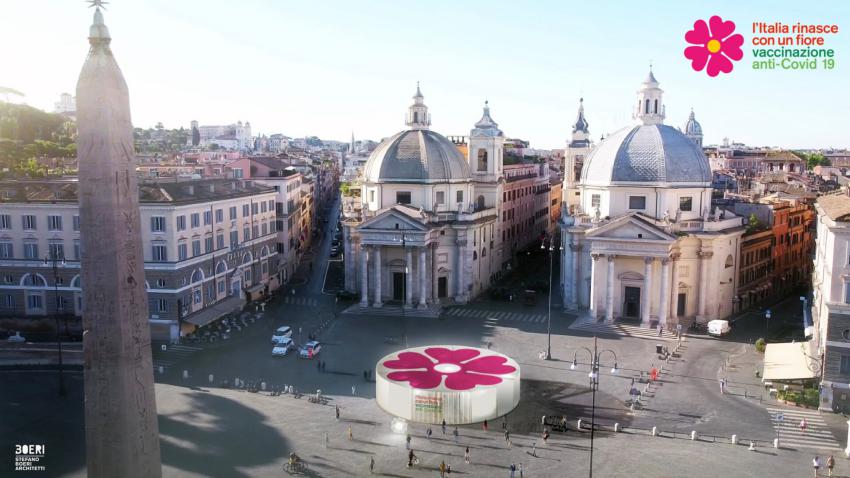
A Milanese architect and a team of consultants came up with the design, which will be used on the temporary pavilions where the vaccine will be available.Credit...Stefano Boeri Architetti
Italy on Sunday unveiled a floral logo and a slogan for its coronavirus vaccination campaign: “With a flower, Italy comes back to life.”
A Milanese architect, Stefano Boeri, and a team of consultants came up with the flower design, which will be used on the temporary pavilions where the vaccine will be dispensed.
“This idea of a spring flower helping us emerge from a dark and cold winter is the message we want to give,” Mr. Boeri said in a streamed news conference on Sunday morning.
About 1.8 million Italians — health workers and nursing home residents — are expected to start receiving the Pfizer vaccine in mid-January, said Domenico Arcuri, the official in charge of the coronavirus response, at the news conference. Vaccines in Europe are awaiting approval from the European Medicines Agency.
About 1,500 pavilions will be set up in the main squares of Italian cities, Mr. Arcuri said, along with information booths also bearing the flower design.
Mr. Arcuri said that logistical questions, such as acquiring needles and syringes, were under control and that Italy had issued “a call to arms for 3,000 doctors and 12,000 nurses” to operate the pavilions.
Italy was the first European country to impose a nationwide lockdown in March, when the coronavirus swelled its hospitals, and a resurgence of the virus in the fall led to restrictions being reimposed. The country has registered a total of more than 64,500 virus deaths, the most in Europe.
Mr. Arcuri said he hoped the “campaign of information and communication” would persuade Italians skeptical of the vaccine that the shots were safe.
Retrieved from: https://www.nytimes.com/live/2020/12/13/world/covid-19-coronavirus/italy-adopts-a-flower-as-the-symbol-of-its-vaccination-campaign
Despite the horrifying surge of Covid-19 cases and deaths in the United States right now, one bit of good epidemiology news is emerging this winter: It now looks unlikely that the country will endure a “twindemic” of flu and the coronavirus hitting at the same time.
That comes as a profound relief to public health officials who predicted as far back as April that thousands of flu victims with pneumonia could pour into hospitals this winter, competing with equally desperate Covid-19 pneumonia victims for scarce ventilators.
“Overall flu activity is low, and lower than we usually see at this time of year,” said Dr. Daniel B. Jernigan, director of the influenza division of the Centers for Disease Control and Prevention. “I don’t think we can definitively say there will be no twindemic; I’ve been working with flu for a long time, and I’ve been burned. But flu is atypically low.”
Since September, the C.D.C. “FluView” — its weekly report on influenza surveillance — has shown all 50 states in shades of green and chartreuse, indicating “minimal” or “low” flu activity. Normally by December, at least a few states are painted in oranges and reds for “moderate” and “high.”
A combination of factors has made the flu season remarkably quiet, experts said.
In the Southern Hemisphere, where winter stretches from June through August, widespread mask-wearing, rigorous lockdowns and other precautions against Covid-19 transmission also drove the incidence of flu down to record lows. In the United States, the cancellation of large indoor gatherings, closings of schools and use of masks have been mitigating all respiratory diseases, including influenza.
That has buoyed the spirits of flu experts.
Dr. William Schaffner, medical director at the National Foundation for Infectious Diseases, which promotes flu shots, said he was recently on a telephone discussion with other preventive medicine specialists. “Everybody was in quiet awe about how low flu is,” he said. “Somebody said: ‘Shh, don’t talk about it. The virus will hear us.’”
Retrieved from: https://www.nytimes.com/live/2020/12/13/world/covid-19-coronavirus/fears-of-a-twindemic-recede-as-the-flu-lies-low
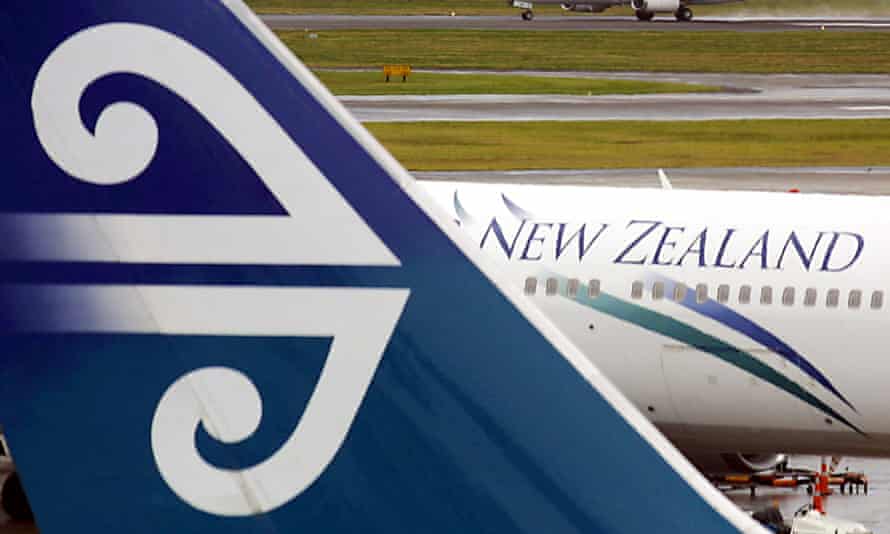
Return travellers to New Zealand must book a place at a quarantine hotel, leading to a months-long wait to return. Photograph: David White/AAP
New Zealanders forced to wait months in Australia for a place in their country’s hotel quarantine program hope Monday’s announcement of an impending travel bubble will allow them to return home quicker.
The New Zealand prime minister, Jacinda Ardern, told reporters on Monday the long-awaited trans-Tasman bubble was expected to begin in the first quarter of 2021.
“It is our intention to name a date ... in the new year, once remaining details are locked down,” she said.
That came as welcome news for New Zealanders waiting up to three months for a hotel, who may now be able to avoid quarantine altogether.
Under New Zealand’s scheme, return travellers must book a place online and are then given 48 hours to confirm they have bought a flight. A spot in managed isolation is mandatory to board a flight to the country.
Serena Bentley, a New Zealander who lives in Melbourne, said: “I’m desperately hopeful [Ardern’s announcement] will impact me. My excitement [about going home] is tempered by the fear of spending two weeks locked in a hotel room with a toddler.”
Unless the bubble is put in place, New Zealanders who have come to Australia for the summer or Christmas without a confirmed spot may be left stranded until March.
NZ authorities acknowledged “peak demand” for quarantine places on Monday, although the situation appeared to have been exacerbated by some travellers “hoarding” several bookings at a time, Radio New Zealand reported.
Bentley said she understood why the NZ government was protecting its status of one of the few Covid-free countries in the world, but that the lack of places was frustrating.
When she booked a place last month, the earliest available spot was 21 January, a two-month wait. By Monday, the quarantine program’s website showed no spots were available until early March.
The Melburnian had hoped to visit her family in Auckland as soon as possible after spending Christmas in Australia with her husband.
“I’m just on the wrong side of the border. I understand what they’re doing and I support it, but I do want to go home,” she said.
Bentley’s husband, who is not a New Zealand citizen, will be unable to join her on the trip unless the bubble becomes a reality. He would be required to pay $3,000 for a room in the program. Bentley and her young child would avoid those costs only by staying in the country longer than 90 days.
Queensland opened the border to New Zealanders on Saturday, so Kiwis could reunite with relatives in that state in time for Christmas. However, the easing of restrictions applies only to people travelling on “green” flights that carry only New Zealand passengers.
New Zealanders can also visit New South Wales and the Northern Territory without quarantining.
Under the current regulations, anyone who returns to New Zealand, including from Australia, must spend 14 days in managed quarantine.
Australians looking to return home have faced similarly long delays since the start of the pandemic, although the Australian system works differently – there is no requirement to book a hotel spot, but because the number of rooms is limited, airlines have had to drastically cut the number of available seats and flights into Australian cities.
A spokesperson for New Zealand’s managed isolation and quarantine program said it was constrained by the number of essential workers available.
“We need nurses, defence personnel and police to run these facilities, and this a limited workforce,” the spokesperson said.
“In addition to workforce supply issues, a minority of hotels meet our requirements. There are a limited number of suitable facilities that are in locations where there is also a suitable hospital facility.
“We’re asking people to be flexible over the period leading into our summer holidays and if there are no available places in managed isolation on their preferred date, to check and see if there are any places available on another nearby date.
“A small number of places do become available from time to time if people cancel their vouchers, so we recommend people check in regularly to see if space has opened up on their preferred dates.”
Here are the key developments from the last few hours:
· After reports that Trump and other White House staff would be offered the coronavirus vaccine on Monday, the US president said he was not scheduled to receive the vaccine, tweeting: “People working in the White House should receive the vaccine somewhat later in the program, unless specifically necessary. I have asked that this adjustment be made. I am not scheduled to take the vaccine, but look forward to doing so at the appropriate time. Thank you!” Although Trump has had coronavirus, his taking it is meant to instil confidence in Americans that the vaccine is safe.
· London mayor said surge in cases “deeply concerning”. The surge in coronavirus cases across London is “deeply concerning” and requires further government action to be brought under control, Sadiq Khan has said. He wrote to Boris Johnson on Sunday requesting for an immediate increase in Covid-19 testing provision across the capital in response to the rising number of infections.
· Vaccination clinics run by family doctors will begin across England from Monday but people have been warned that a rise in cases after Christmas socialising could disrupt the rollout of protective jabs. GP practices in more than 100 locations will have the approved Pfizer/BioNTech vaccine delivered to them on Monday, with some offering vaccinations within hours.
· South Korea ordered schools to shut. South Korea ordered schools to close from Tuesday in the capital, Seoul, and surrounding areas as it battles its worst outbreak of novel coronavirus since the pandemic began, surpassing the previous peak in February.
· The US is on the brink of marking the sad milestone of 300,000 dead from coronavirus in just under a year. The US death toll, a fifth of the global total, stands at 299,168, according to Johns Hopkins University.
· ESwatini (formerly Swaziland) prime minister Ambrose Dlamini, who tested positive for Covid-19 four weeks ago, has died at the age of 52 after being hospitalised in neighbouring South Africa, the tiny absolute monarchy’s government said late on Sunday.
· The Dutch government will decide on stricter measures to fight the coronavirus outbreak in the Netherlands on Monday, as the country reported the biggest rise in infections in more than six weeks.
· Schools in Greenwich, south-east London, have been asked to close from Monday evening after “exponential growth” of coronavirus demanded “immediate action”, the council said, amid reports that the capital is likely to enter tier 3 soon.
· Bahrain has approved a Covid-19 vaccine developed by China National Pharmaceutical Group (Sinopharm) and launched online registration for the vaccine for citizens and residents. Citizens and residents above 18 years of age could register online to receive the vaccine for free.
· Mauritania has reimposed a night-time curfew in in the face of a “worrying surge” in Covid-19 cases and deaths, the president’s office said.
· Greece has reported 693 new coronavirus cases – the lowest daily figure since mid-October. There have been a further 85 deaths.
· Algeria’s president Abdelmadjid Tebboune has said he is recovering from Covid-19, in his first televised appearance since he was treated in a German hospital almost two months ago.